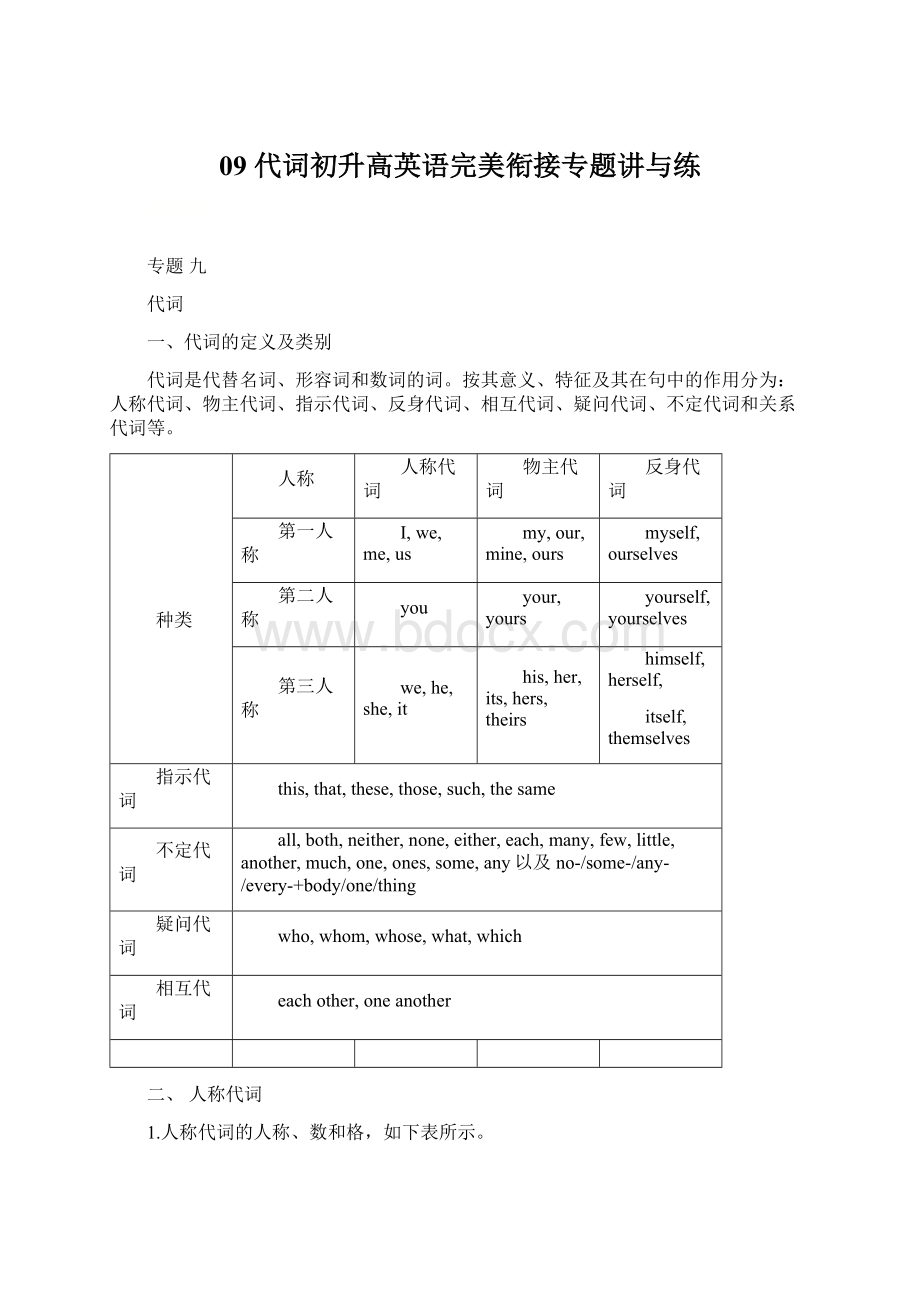09 代词初升高英语完美衔接专题讲与练文档格式.docx
《09 代词初升高英语完美衔接专题讲与练文档格式.docx》由会员分享,可在线阅读,更多相关《09 代词初升高英语完美衔接专题讲与练文档格式.docx(10页珍藏版)》请在冰豆网上搜索。

二、人称代词
1.人称代词的人称、数和格,如下表所示。
2.人称代词有主格和宾格之分。
通常主格作主语,宾格作宾语。
如:
Iliketabletennis.(作主语)
Doyouknowhim?
(作宾语)
3.人称代词还可作表语。
作表语时用宾格。
---Whosisknockingatthedoor?
---It’sme.
4.人称代词在than之后与其他人或事物进行比较时,用主格和宾格都可以。
如
:
Heisolderthanme.
HeisolderthanIam.
三、物主代词
1.表示所有关系的代词叫物主代词。
物主代词分形容词性物主代词和名词性物主代词,如下表所示。
2.形容词性物主代词的作用相当于形容词,可在句中作定语。
例如:
Ourteacheriscomingtoseeus.
Thisisherpencil-box.
3.名词性物主代词的作用相当于名词,在句中可用作主语、宾语和表语。
Ourschoolishere,andtheirsisthere.(作主语)
---IsthisEnglish-bookyours?
(作表语)
---No.Mineisinmybag.
I'
vealreadyfinishedmyhomework.Haveyoufinishedyours?
(作宾语)
四、指示代词
指示代词包括:
this,that,these,those。
1.this和these一般用来指在时间或空间上较近的事物或人,that和those
则指时间和空间上较远的事物或人,例如:
Thisisapenandthatisapencil.
Wearebusythesedays.
Inthosedaystheworkershadahardtime.
2.有时that和those指前面讲到过的事物,this和these则是指下面将要讲
到的事物,例如:
Ihadacold.That'
swhyIdidn'
tcome.
WhatIwanttosayisthis;
pronunciat
ionisveryimportantinlearningEnglish.
3.有时为了避免重复提到的名词,常可用that或those代替,例如:
TelevisionsetsmadeinBeijingarejustasgoodasthosemadeinShanghai.
4.this在电话用语中代表自己,that则代表对方。
Hello!
ThisisMary.IsthatJackspeaking?
五、反身代词
英语中用来表示“我自己”,“你自己”,“他自己”,“我们自己”,“你们自己”等意义的代词称为反身代词,也有人称之为自身代名词,其形式如表所示。
反身代词可以在句中作宾语,表语,同位语。
1.作宾语,表示动作的承受者就是动作的发出者,主语和宾语指同一个人
或一些人。
Hecalledhimselfawriter.
WouldyoupleaseexpressyourselfinEnglish?
2.作表语。
Itdoesn'
tmatter.I'
llbemyselfsoon.
Thegirlinthenewsismyself.
3.作主语或宾语的同位语,表示亲自或本人。
Imyselfwashedtheclothes.(=Iwashedtheclothesmyself.)(作主语同位语)
Youshouldasktheteacherhimself.(作宾语同位语)
六、不定代词
不是指明代替任何特定名词的代词叫做不定代词,在句中可作主语、表
语、宾语和定语。
现将几个常用的不定代词举例说明如下:
1.some与any的区别
1)some多用于肯定句,表示“一些,几个”作形容词时,后面可以接①不可数名词+单数动词;
②可数名词+复数动词。
Look!
Someofthestudentsarecleaningthelibrary.
Somericeinthebaghasbeensoldout.
2)any多用于疑问句、条件句和否定句中,表示“一些,任何”用作形容词时,后面可以接①不可数名词+单数动词;
Ifyouhavean
yquestions,pleaseaskme.
Thereisn'
tanyorangeinthebottle.
Haveyougotanytea?
3)any和some也可以作代词用,表示“一些”。
any多用于疑问句或否定句中,some多用于肯定句中。
Howmanypeoplecanyouseeinthepicture?
Ican'
tseeany.
Ifyouhavenomoney,I'
lllendyousome.
【注意】与some,any结合的词如something,somebody,someone,anything,any
one,anybody在肯定句、否定句、疑问句、条件句中的用法,大致和some,any的用法相同。
2.few,afew,little,alittle在用法上的区别
1)用作形容词:
含义
用法
表示肯定
表示否定
用于可数名词
afew虽少,但有几个
few不多,几乎没有
用于不可数名词
alittle,虽少,但有一点
little不多,没有什么
I'
mgoingtobuyafewapples.
HecanspeakonlyalittleChinese.
Thereisonlyalittlemilkintheglass.
Hehasfewfriends.
Theyhadlittlemoneywiththem.
2)alittle和little也可以用作副词,alittle表示“有点,稍微”,little表示“很少”。
malittlehungry.(修饰形容词hungry)
Lethimsleepalittle.(修饰动词sleep)
Mary,goa
littlefaster,please.(修饰副词比较级)
Shesleptverylittlelastnight.
3.other,theother,another,others,theothers的区别。
用法
代名词
形容词
单数
复数
不定
another
另一个
others
别人,其他人
another(boy)
另一个(男孩)
other(boys)
其他男孩
特定
theother
theothers
其余那些人、物
theother(boy)
另一个男孩
theother(boys)
其余那些男孩
1)other可以作形容词用,后面可以跟单数或复数名词,意思是“其他的、别的”。
Wherearehisotherbooks?
Ihaven'
tanyotherbooksexceptthisone.
2)other也可以用作代词,与冠词the连用构成“theother”,表示两个人或物中的“另一个”。
常与one搭配构成“one...,theother...”句型。
Hehastwobrothers.Oneis10yearsold,theotheris5yearsold.
Sheheldarulerinonehandandanexercise-bookintheother.
3)other作代词用时,可以有复数“others”,泛指“另外的人或物”。
常与some搭配构成“some....,others...”句型。
Somewenttothecinema,otherswentswimming.
Thiscoatistoolarge.Showmesomeothers,please.
4)“theothers”表示特指某范围内的“其他的人或物”。
Wegothomeby4o'
clock,buttheothersdidn'
tgetbackuntil8o'
clock.
InourclassonlyTomisEnglish,theothersareChinese.
5)another可以作形容词用,修饰后面的名词,意为“另一个”,还可以跟代词one.
Youcanseeanothershipinthesea,can'
tyou?
Marydoesn'
twanttobuythisskirt.Wouldyoupleaseshowheranotherone?
6)another也可以作代词用,表示“另一个”。
mstillhungryafterI'
vehadthiscake.Pleasegivemeanother.
4.ever
y与each的区别。
each
every
1)可单独使用
1)不可单独使用
2)可做代名词、形容词
2)仅作形容词
3)着重“个别”
3)着重“全体”,毫无例外
4)用于两者或两者以上中的每一个人或物
4)用于三者或三者以上每一个人或物
Theteachergaveatoytoeachchild.
Eachballhasadifferentcolour.
当我们说eachchild,eachstudent或eachteacher时,我们想到的是一个人的情况。
而当我们说everychild和everystudent时,我们想到的是全体的情况,every的意思与all接近,表示他们都如此。
EverystudentlovestheEnglishteacher.=AllstudentslovetheEnglishteacher.
Everychildlikesplaying.=Allchildrenlikeplaying.
5.all和both的用法。
1)all指三者以上,或不可数的东西。
谓语动词既
可以用单数,也可以用作复数。
在句中作主语、表语、宾语、同位语和定语。
AllofuslikeMrPope.我们都喜欢Pope先生。
(作主语)
=WealllikeMrPope.(作同位语)
Allthewaterhasbeenusedup.(作主语)
That'
sallfortoday.(作表语)
Whynoteatall(of)thefish?
Alltheleadersarehere.(作定语)
2)both作代词。
①与其他名词或代词并列出
现,表示“两个都”。
LucyandLilybothagreewithus.
Theybothpas
sedontheirsticksatthesametime.
Howareyourparents?
They'
rebothfine.
②与“of+代词(或名词)”连用,表示“两者都”。
BothofthemcametoseeMary.
Bothofthebooksareveryinteresting.
③单独使用,表示“两者(都)”。
Michaelhastwosons.Bothareclever.
Idon'
tknowwhichbookisthebetter,Ishallreadboth.
3)both用作形容词,放在名词之前,修饰该名词,表示“两者都”。
Bothhisyoungersistersareourclassmates.
Therearetalltreesonbothsidesofthestreet.
七、相互代词
表示相互关系的代词叫做相互代词。
相互代词有eachother和oneanother两种形式。
在当代英语中,eachother和oneanother没有什么区别。
相互代词可在句中作宾语,定语。
作定语用时,相互代词用所有格形式。
Weshouldlearnfromeachother/oneanother.(作宾语)
Doyouoftenwritetoeachother/oneanother?
Weoftenborroweachother'
s/oneanother'
sbooks.(作定语)
Thestudentscorrectedeachother'
smistakesintheirhomework.(作定语)
八、疑问代词
疑问代词有who,whom,whose,what和which等。
疑问代词用于特殊疑
问句中,一般都放在句首,并在句子中作为某一句子成分。
Whoisgoingtocomeheretomorrow?
(作主语)
Whatisthat?
Whoseumbrellaisthis?
(作定语)
Whomareyouwaitingfor?
八.关系代词
关系代词是一种引导从句并起连接主句和从句作用的代词。
关系代词有who,whose,whom,that,which.它们在句中可用作主语,表语,宾语,定语.在主句中,它们还代表着从句所修饰的那个名词或代词。
Ihatepeoplewhotalkmuchbutdolittle.
I’mlookingatthephotographwhichyousentmewithyourletter.
Withthemoneythathehad
saved,hewentonwithhisstudies.
Doyouknowtheladywhoisinterviewingourheadmaster?
Exercise:
1.Tom,Pleasepass________theglasses.Iwanttoreadthenewspapers.
A.youB.meC.himD.her
2.TheEnglishnovelisquiteeasyforyou.Thereare______newwordsinit.
A.alittleB.littleC.afewD.few
3.---Youwant________sandwich?
---Yes,IusuallyeatalotwhenI’mhungry.
A.otherB.anotherC.othersD.theother
4.ThedoctorsandnursesaredoingtheirbesttofightSARS.Theythinkmoreofothersthan_______.
A.theyB.themC.themselvesD.theirs
5.---Whichdoyouprefer,abottleoforangeorabottleofmilk?
---______________,thanks.I’dlikeacupoftea.
A.EitherB.NeitherC.BothD.None
6.---Oh!
Icameinahurryandforgottobringfood.
---Nevermind.Youcanhave________.
A.usB.oursC.youD.yours
7.---CanIcomethiseveningortomorrowmorning?
---_______isOK.I’mfreetodayandtomorrow.
A.EitherB.NeitherC.Both
D.None
8.---Howareyougoingtoimprove_______thisterm?
---Workharderthanlastterm.
A.ourselvesB.myselfC.himselfD.yourself
9.---Couldyoutellme_______sheislookingfor?
---Hercousin,Susan.
A.thatB.whoseC.whoD.which
10.---Is_______here?
---No.LiLeiandHanMeihaveaskedforleave.
A.everybodyB.somebodyC.anybodyD.nobody
11.Paulhas_______friendsexceptme,andsometimeshefeelslonely.
A.manyB.someC.fewD.more
12.Ifyouwanttobookaround-tripticket,you’llhavetopay______$30.
A.moreB.otherC.theotherD.another
13.---Doyoulivebyyourself,MrWang?
---Yes.Ihavetwosons.But______ofthemliveswithme.TheyarenowstudyinginAmerica?
A.neitherB.bothC.noneD.either
14.---HaveyousentyourparentsanE-mailtellingthemyouarrivedsafe?
---No._______ofthemcanuseacomputer.
A.NoneB.BothC.NeitherD.All
15.Whotaught_______Englishlastterm?
Was_____Mr.Smith?
A.you;
itB.you;
heC.your;
itD.your;
that
16.---Thatwomanhasabaginherrighthand.What’sinher_____hand?
A
.anotherB.otherC.oneD.theother
17.Wedecidedtogo
forafieldtripwithsomefriendsof_______.
A.usB.ourC.oursD.ourselves
18.---Isthereabustothezoo?
---I’mafraidthere’s_______bustothezoo.
A.noB.anyC.someD.none
19.Youforgotyourdictionary?
Youmayhave_______.